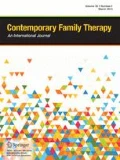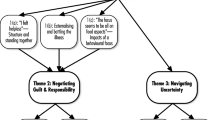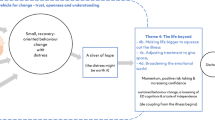Abstract
Maudsley family based treatment (FBT) continues to demonstrate promising evidence in the treatment of adolescent presentations of anorexia nervosa. In the earlier stages of this treatment modality, the process of empowering families, and in particular, helping parent to follow their natural instincts in making united decisions around re-feeding their child is critical. This paper aims to provide FBT practitioners with structured interviewing guidelines around the amplification of familial interactions around food, drawing on existing familial strengths and therefore empowering parents and families in their process of change. The questioning skills outlined are discussed in light of the theoretical tenets of the Maudsley FBT model.

Similar content being viewed by others
References
Couturier, J., Kimber, M., & Szatmari, P. (2012). Efficacy of family-based treatment for adolescents with eating disorders: A systematic review and meta-analysis. International Journal of Eating Disorders. doi:10.1002/eat.22042.
Dare, C. (1985). The family therapy of anorexia nervosa. Journal of Psychiatric Research, 19, 435–453.
Dare, C., Eisler, I., Russell, G. F. M., & Smuckler, G. L. (1990). The clinical and theoretical impact of a controlled trial of family therapy in anorexia nervosa. Journal of Marital and Family Therapy, 16, 39–57.
Doyle, P. M., Le Grange, D., Loeb, K., Doyle, A. C., & Crosby, R. D. (2010). Early response to family-based treatment for adolescent anorexia nervosa. International Journal of Eating Disorders, 43, 659–662. doi:10.1002/eat.20764.
Eisler, I. (2011). Update on treatment and care pathways for adolescent anorexia nervosa. Keynote presentation at international conference on eating disorders, April 28–30, 2011, Miami, USA.
Ellison, R., Rhodes, P., Madden, S., Miskovic, K., Wallis, A., Baillie, A., et al. (2012). Do the components of manualised family-based treatment for anorexia nervosa predict weight gain? International Journal of Eating Disorders, 45, 609–614. doi:10.1002/eat.2200.
Fisher, C. A., Hetrick, S. E., & Rushford, N. (2010). Family therapy for anorexia nervosa (review). The Cochrane Collaboration. The Cochrane Library, Issue 6.
Gull, W. (1874). Anorexia nervosa (apepsia hysterica, anorexia hysterica). Transactions of the Clinical Society of London, 7, 222–228.
Le Grange, D., & Eisler, E. (2009). Family interventions in adolescent anorexia nervosa. Child and Adolescent Psychiatric Clinics of North America, 18, 159–173. doi:10.1016/j.chc.2008.07.004.
Le Grange, D., Lock, J., Loeb, K., & Nicholls, D. (2010). Academy for eating disorders position paper: The role of the family in eating disorders. International Journal of Eating Disorders, 43, 1–5. doi:10.1002/eat.20751.
Lock, J., Le Grange, D., Agras, W. S., & Dare, C. (2001). Treatment manual for anorexia nervosa: A family-based approach. New York: Guilford Press.
Lock, J., Le Grange, D., Agras, W. S., Moye, A., Bryson, S. W., & Jo, B. (2010). Randomized clinical trial comparing family-based treatment with adolescent-focussed individual therapy for adolescents with anorexia nervosa. Archives of General Psychiatry, 67, 1025–1032.
Madanes, C. (1981). Strategic family therapy. San Francisco, CA, and London: Jossey-Bass.
Minuchin, S., Rosman, B., & Baker, L. (1978). Psychosomatic families: Anorexia nervosa in context. Cambridge, MA: Harvard University Press.
Rhodes, P. (2003). The Maudsley model of family therapy for children and adolescents with anorexia nervosa: Theory, clinical practice, and empirical support. Australian & New Zealand Journal of Family Therapy, 24, 191–198.
Rhodes, P. (2008). Amplifying deviations in family interactions: Guidelines for trainees in Post-Milan family therapy. Australian & New Zealand Journal of Family Therapy, 29, 34–39.
Russell, G. F. M., Szmukler, G. I., Dare, C., & Eisler, I. (1987). An evaluation of family therapy in anorexia nervosa and bulimia nervosa. Archives of General Psychiatry, 44, 1047–1056.
Selvini Palazzoli, M. (1974). Self-starvation: From the intrapsychic to transpersonal approach. London: Chaucer.
Tomm, K. (1987a). Interventive interviewing: Part I. Strategizing as a fourth guideline for the therapist. Family Process, 26, 3–13.
Tomm, K. (1987b). Interventive interviewing: Part II. Reflexive questioning as a means to enable self-healing. Family Process, 26, 167–183.
White, M. (1987). Anorexia nervosa: A cybernetic perspective. Family Therapy Collections, 20, 117–129.
Whitney, J., & Eisler, I. (2005). Theoretical and empirical models around caring for someone with an eating disorder: The reorganization of family life and inter-personal maintenance factors. Journal of Mental Health, 14, 575–585. doi:10.1080/09638230500347889.
Author information
Authors and Affiliations
Corresponding author
Rights and permissions
About this article
Cite this article
Murray, S.B., Wallis, A. & Rhodes, P. The Questioning Process in Maudsley Family-Based Treatment. Part 1: Deviation Amplification. Contemp Fam Ther 34, 582–592 (2012). https://doi.org/10.1007/s10591-012-9217-3
Published:
Issue Date:
DOI: https://doi.org/10.1007/s10591-012-9217-3




